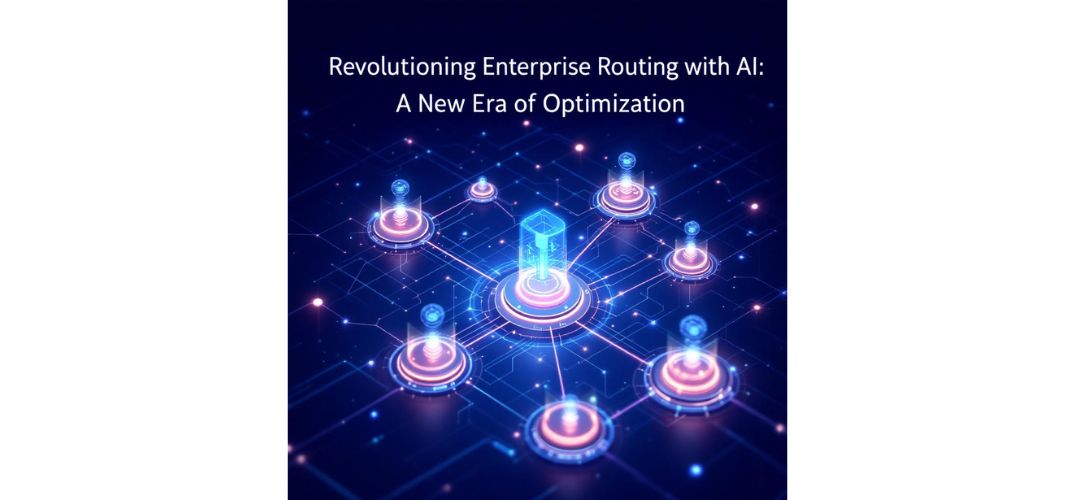In this modern era, artificial intelligence (AI) is reshaping enterprise operations, and nowhere is its impact more evident than in routing systems. Nandini Suresh Kumar, industry expert, explores how AI-driven routing solutions enhance efficiency, security, and adaptability in enterprise environments. Her insights provide a comprehensive look into the innovations shaping modern network infrastructure, driving new business opportunities.
The Evolution of Enterprise Routing Systems
Traditional enterprise routing relied on static, rule-based approaches, which often fell short in handling the complexities of modern networks effectively. AI-driven systems, however, employ dynamic adaptation and predictive analytics, enabling organizations to manage high-volume data flows with enhanced precision. These innovations have led to significant improvements in network efficiency and resource utilization, ensuring seamless performance even under fluctuating demands and conditions.
Intelligent Workflow Orchestration
AI-powered routing systems leverage deep learning algorithms to optimize resource allocation and task distribution effectively. By analyzing historical performance metrics and real-time operational states, these systems make informed decisions that enhance workflow efficiency. The incorporation of behavioral pattern recognition further refines task prioritization, allowing enterprises to maximize productivity while minimizing delays and improving outcomes.
Real-Time Monitoring and Adaptability
Modern AI-driven routing frameworks incorporate real-time monitoring mechanisms that continuously assess network conditions and workload patterns in dynamic environments. Advanced machine learning models analyze telemetry data to predict congestion points and automatically adjust routing decisions. This ensures optimal system performance and prevents bottlenecks before they arise, improving overall network reliability.
Data Infrastructure and Integration
A critical component of AI-powered routing lies in its data infrastructure and integration framework. High-quality data management frameworks ensure accuracy, consistency, and timeliness in decision-making processes. Organizations integrating machine learning techniques into data validation can detect and correct errors more efficiently, leading to improved operational resilience and a reduction in system disruptions that could impact productivity.
Enhancing Security and Compliance
Security in AI-driven routing systems extends beyond conventional cybersecurity measures. AI models must be safeguarded against adversarial attacks and unauthorized access. Advanced authentication mechanisms, such as behavioral biometrics, improve system security while maintaining ease of use for employees. Additionally, AI-specific compliance frameworks help organizations adhere to regulatory requirements while leveraging the benefits of intelligent routing solutions.
User-Centric Design and Transparency
The adoption of AI in routing systems requires a user-friendly interface that enhances trust and transparency for enterprise teams. Explainable AI (XAI) features ensure that users understand system decisions, fostering confidence in automated processes. Implementing clear feedback mechanisms and human-centered design approaches contributes to higher acceptance rates and smoother enterprise integration across industries.
Scalability and Performance Optimization
One of the biggest challenges in enterprise routing is ensuring systems can scale efficiently while maintaining high performance under varying demands. AI-driven routing solutions leverage predictive analytics to allocate resources dynamically, preventing network slowdowns during peak loads or congestion. By continuously analyzing performance metrics, these systems can fine-tune routing strategies to ensure seamless operations regardless of demand fluctuations.
AI-Powered Decision-Making in Network Management
AI’s ability to make autonomous, data-driven decisions has transformed enterprise network management for businesses worldwide. Intelligent routing systems analyze traffic patterns, detect anomalies, and make split-second adjustments to improve efficiency and security. These AI-powered decision-making capabilities enhance overall network reliability and free up human resources, allowing IT teams to focus on higher-level strategic initiatives.
The Future of AI-Driven Routing
As AI technology continues to evolve, enterprise routing systems will become even more sophisticated and efficient in managing network resources. Emerging innovations in predictive analytics, real-time observability, and adaptive learning will drive further efficiency gains, automation, and operational excellence. Organizations that embrace AI-powered routing solutions stand to benefit from enhanced scalability, improved security, and greater operational agility, ensuring long-term success in competitive business landscapes.
In conclusion, the implementation of AI-driven routing systems marks a significant advancement in enterprise technology and network management. By integrating machine learning, real-time monitoring, and robust security frameworks, businesses can optimize their network operations while maintaining reliability and compliance with evolving regulations. As Nandini Suresh Kumar highlights, the future of enterprise routing lies in intelligent, adaptable, and transparent AI systems that drive efficiency and innovation, reshaping how businesses operate in a digital-first era.

































